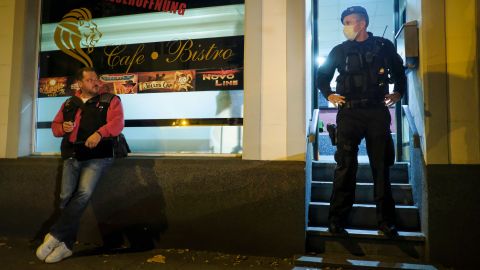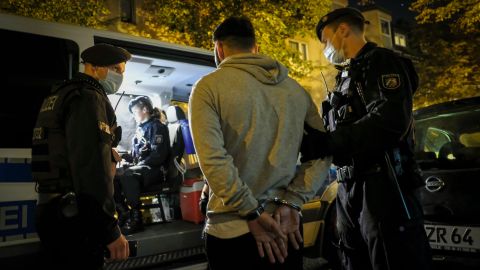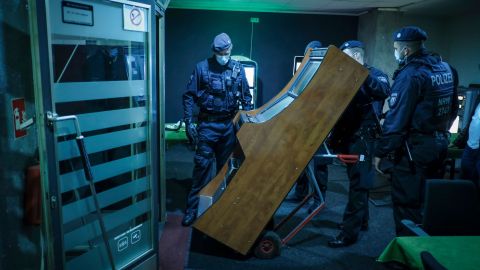We are once again beating the bush. Every time we carry out an inspection, we register massive violations and take rigorous action against them. Today we are focusing on gambling," explains the police chief superintendent and deputy chief of police. North Rhine-Westphalia has declared war on criminal clans. Essen is a hotspot. Riot police, customs officers and representatives of the public order office have gathered under the industrial monument to discuss their next steps. The policy of a thousand pinpricks has proved its worth in the largest city in the Ruhr region. 699 clan crimes ranging from minor offences to armed organized crime were recorded by the NRW State Office of Criminal Investigation in the 2020 Clan Crime Situation Report. "We are demonstrating that the state is not weak," explains Stratmann. "On the contrary." More and more people from the milieu are realizing that it makes no sense to ignore the law.
During the preliminary meeting, Criminal Director Bernd Röser highlighted the advantages of the concept, which is based on the establishment of a special organizational structure (BAO) at the end of 2018. "We can now tackle clan crime quickly and effectively," emphasized the head of the BAO. The illegal activities of shady shisha bars, betting shops, gambling halls, cocktail bars, tea rooms, vehicle dealers, leasing companies, car rental companies, barbershops, etc. are no longer tolerated. "The pressure to control is increasing. Some business owners are cooperative, others give up," reports Röser. "We have zero tolerance."
In Essen and Mülheim, there are currently 363 properties on a list of businesses that have not taken laws and regulations very seriously. Regular checks are carried out to ensure that operators are finally complying with the rules. "The low-threshold approach has paid off," concludes the Ruhr area native. He has both a criminal police background and experience in security policing. Both are in demand in his role as head of the BAO.
The officer particularly praises the cooperation with the network partners at customs, the district government, the public prosecutor's offices, the municipal authorities and the tax authorities. "The BAO's findings are transmitted to the network partners in a targeted manner in order to carry out the task in the respective area of responsibility. From there, the findings flow into numerous operational measures and investigative proceedings."
The criminal members of extended families of Turkish-Arab origin with links to the Mhallamye population group or Lebanon have had a considerable impact on citizens' sense of security. Many extended families immigrated to Germany during the civil war in Lebanon between 1975 and 1990. Quite a few settled in the Ruhr region. "Of course, the majority have now integrated into our society," explains BAO boss Röser. Others, however, have slipped into crime. More than 10,000 members of these extended families live in the Essen area. Around three percent of them commit crimes every year.
"These offenders are our target group. Some still live in parallel worlds with their own rules and values," comments a BAO investigator. Half a dozen clans have made a particularly negative appearance in Essen so far. The number of multiple offenders is high. Around five percent of suspects were responsible for five or more crimes last year. Most of them are male and under 30 years old.
"When conflicts arise between the clan families, they often do not turn to the police, but to justices of the peace from their own community - who are not legitimized under German law," says the 34-year-old chief detective inspector, explaining how they are disconnected from the rest of society. The men have the task of increasing the family's reputation and procuring financial resources for the family. "But sometimes that doesn't work by legal means." State representatives are often threatened and insulted. "It starts with the traffic wardens and refuse collectors." It is very important to talk to people repeatedly and respectfully so that they gain trust in our system, says the investigator.
"We take intensive care of the victims of criminal clan members," says Frank Fesselmann, head of the Prevention and Victim Protection Unit. "We support anyone who wants to testify against suspected perpetrators in court and show children and young people who have committed crimes alternative paths."
At weekends, but also twice during the week, the riot police carry out large-scale operations with the network partners. "Of course, we hit different locations at different times," says Stratmann. "So that nobody can get used to it."
On average, 10 to 15 properties and up to 150 people are checked during each clan operation. Now they are heading to Katernberg in the north of Essen with several team cars. A betting office is about to be inspected and customs are particularly interested in it. The local court has issued a seizure order for 500,000 euros. The operator runs more than ten stores, but pays very little tax. Customs assume that employees have not been registered and that social security contributions have been withheld.
Customs had three betting machines opened. But they only contained 250 euros. The business cash register is also not very rich with around 750 euros. A total of 1,002 euros is seized. The store is pretty empty. Everything goes almost silently. As a by-catch, the police come across boxes of sexual enhancers. "That will result in criminal charges," says Stratmann. "We suspect that the Medicines Act has been violated here."
The caravan moves on to Altenessen. In a café with playground equipment, the guests are irritated by the late-night visit from the state. A few older people sit at the front having tea. In the back room, a few younger people are watching two fighters beating each other in a cage on a large screen. There is playground equipment to the left and right. It smells of marijuana. Using Fast ID and a data comparison, it turns out that a man in his mid-thirties is wanted on a warrant. He is accused of causing grievous bodily harm. During a fight between two clans - apparently both parties felt their honor had been violated - the arrested man is said to have attacked and hit an inferior opponent with a jumped-in kick. The man stoically accepts the fact that he is now being taken away.
Meanwhile, the public order office found violations of the Non-Smoking Act and the Corona Protection Ordinance. Sascha Wehner, officer in charge of illegal gambling at the BAO, recognizes two prohibited gaming machines at first glance. The compact table machine and an unlicensed machine with a wooden casing are confiscated and placed in the already well-stocked evidence room. In addition, only two gaming machines are allowed in the store. But there are four. Head of operations Stratmann suspects that the operator will face at least one hefty fine in addition to criminal proceedings. "He's been noticed umpteen times and yet we find something every time."
Criminal Superintendent Wehner sees illegal gambling as one of the criminal clans' many lines of business. "We have been observing for more than a year that real money is being made with it." You suddenly come across many slot machines with poker, blackjack, baccarat and countless other games. The machines don't pay out any money and are supposedly legal. "However, the machines cost around 13,000 euros to buy. What sense does that make for small stalls?" The chief inspector reports on a case in which a machine generates a monthly turnover of around 33,000 euros and a profit of 13,000 euros, as the operators do indeed pay out winnings to the players.
Despite this, the BAO in Essen has managed to put a stop to the illegal activities of the clans - and not just when it comes to gambling. The control operations are planned a month in advance. The motto is: "Follow the money." Money laundering is made more difficult through continuous checks on dubious businesses as well as regulatory and criminal measures. Luxury cars are consistently taken out of circulation. If it can be assumed that people identified as destitute - often Hartz IV recipients - are the actual owners, the BAO and its network partners pursue welfare fraud and possible tax evasion.
Some shisha bars have also had to close because business has become increasingly difficult due to the consistent prosecution of violations of the law. Drug dealers, fraudsters, burglars and usurers are on the trail. The result of the first investigation commissions and the fight against prolific offenders: 30 convicts with a total of almost 80 years in prison. The police were able to de-escalate riot situations. "It's become pretty uncomfortable for the clan criminals in Essen," summarizes head of operations Bernhard Stratmann. "Perhaps even the last of them will soon realize that our state is not a paper tiger."





